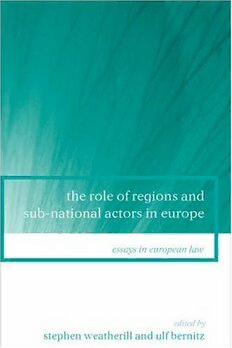
The Role Of Regions And Sub-National Actors In Europe PDF
174 Pages·2005·0.639 MB·English
Most books are stored in the elastic cloud where traffic is expensive. For this reason, we have a limit on daily download.
Preview The Role Of Regions And Sub-National Actors In Europe
Description:
The essays gathered in this collection examine the involvement of self-governing sub-national and regional actors in the law and policy making of the European Union. State power is today exercised in the context of the complex institutional environment of the EU. But what of regions and sub-national actors? Are their interests adequately represented? Can they advance their interests or can they, at least, protect them from unwitting or calculated damage? This book surveys the broad questions of law and political science and investigates the contribution of the EU's Committee of the Regions and also 'bottom-up' initiatives launched by the regions themselves. Given that much regional autonomy has been hard won, one would suppose that the centralizing influence flowing from the EU's intrusion into the domestic settlement would be treated with extreme caution by the regions. Moreover, among the member states there is great diversity in the patterns of political organization adopted to cope with the tension between the centralization of power and respect for local autonomy. Case studies including Spain, Germany and Finland reveal that there is no single consistent historical narrative. States change, as the UK's recent experience illustrates. The book offers findings that are interesting at a general level in investigating patterns of multi-level governance, but is also rich in case-specific information.
See more
The list of books you might like
Most books are stored in the elastic cloud where traffic is expensive. For this reason, we have a limit on daily download.
